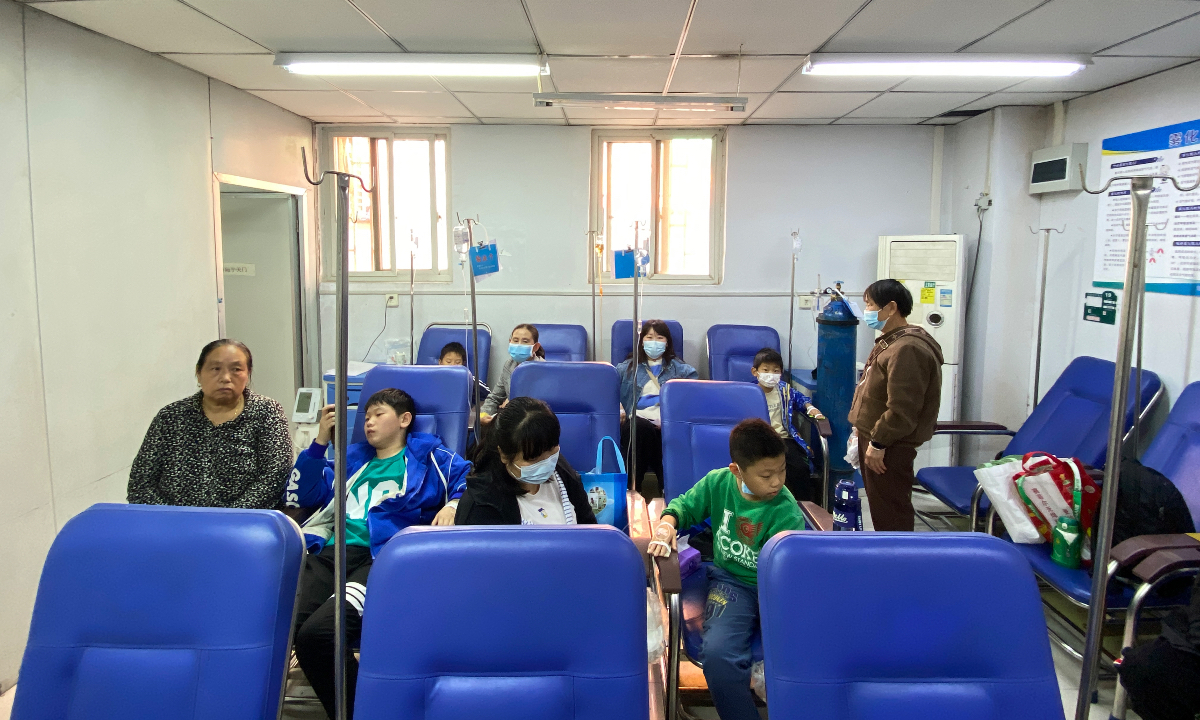Infection
Hospitals’ pediatrics departments operating at peaks, with emerging cross-infection of MPP and other respiratory diseases
Patients with mycoplasma pneumoniae infection get IVs at a hospital in Zhengzhou in Central China’s Henan Province on October 20, 2023. Photo: IC
The number of patients at pediatrics departments at hospitals in multiple places across China have remained at peaks in recent days, with cross-infection cases of different respiratory diseases emerging. Experts remind the public to be cautious about cross-infection of mycoplasma pneumoniae pneumonia (MPP) and other respiratory diseases, but denied a higher-than-usual incidence rate than that in previous years.
From North China’s Beijing Municipality and Hebei Province to Central China’s Henan Province, and further down to South China’s Guangxi Zhuang Autonomous Region, patients to outpatient service and emergency care of pediatrics departments in multiple places have remained at high levels over the weekend, the Health Times affiliated to People’s Daily reported on Sunday.
In Beijing, the average daily number of outpatient visits to the Capital Institute of Pediatrics have remained at 2,000.
The Beijing Friendship Hospital affiliated to Capital Medical University announced on Thursday that the fast spreading of MPP and other respiratory diseases have led to the surging patients to the pediatrics department at the hospital, with the average daily number of patients to the two branches of the hospital reaching 1,600 to 1,800.
In Henan, the average weekly outpatient visits to the pediatrics department at the First Affiliated Hospital of Henan University of Chinese Medicine have neared 20,000 with the daily number of visits nearing 3,000, reaching saturation, deputy director of the hospital’s pediatrics department Zhou Rongyi told the Health Times, noting the respiratory diseases in children account for 60 percent with the major symptoms including cough and pneumonia.
In Guangxi, the Liuzhou Maternity and Child Healthcare Hospital revealed on its WeChat account on Friday that the average daily visits to the outpatient service and emergency care at the pediatrics department at the hospital remained at 1,300 or above.
Multiple doctors think that this year is a major epidemic year of MPP. The superimposed impact of multiple factors such as influenza has led to increased patient visits to the pediatrics department.
In many hospitals in Southwest China’s Sichuan Province, the number of pediatric outpatient and inpatient cases has increased compared to previous years. There are more cases of MPP, and a small number of children are infected with influenza, respiratory syncytial virus and other viruses.
After the infection of mycoplasma pneumoniae, there is a possibility of cross-infection with multiple viruses or bacteria, Xia Wanmin, director of pediatric respiratory department of the Chengdu Women’s and Children’s Central Hospital, told media, noting that the rate of concurrent viral infections caused by MPP has not been specifically calculated, but it is reported to be around 30 percent according to previous literature.
However, Wang Guiqiang, director of the infectious diseases department at Peking University First Hospital, said on Friday during an interview that patients of respiratory diseases this year are no more than those in previous years, and the incidence of mycoplasma infection has always remained relatively high in China. The reason why the public feel an apparent increase in mycoplasma pneumoniae infection is because of the etiologic detection.
According to Wang, respiratory diseases such as MPP, influenza and adenovirus are prevalent in China every year, especially in the autumn and winter seasons. “During the COVID-19 epidemic, there was a long period when people paid less attention to other respiratory diseases, whereas after the COVID-19 pandemic ended, increased awareness of respiratory diseases created a perception of an increase in such diseases,” Wang said.
Despite Wang agreeing that autumn and winter indeed constitute the peak period for MPP, the autumn and winter seasons also constitute a significant increase in children with common colds. In the past, MPP was diagnosed as common cold without etiologic detection being conducted. Nowadays, MPP is diagnosed more frequently through conducting etiologic detection.
The Beijing Center for Disease Prevention and Control has reminded that schools are prone to clustered infections. Therefore, they should reduce group activities this winter, given the superimposed prevalence of influenza, COVID-19, and other respiratory diseases.
Although children have a higher incidence of catching MPP, special attention should also be paid to elderly individuals with underlying health conditions, Wang said.
Once the elderly contract respiratory infection, it may damage the immune barrier of their upper respiratory tract, leading to bacterial infections, which would ultimately result in the deterioration of their condition, Wang noted.
Global Times

